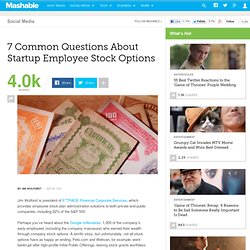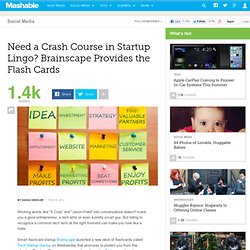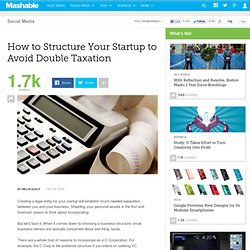

9 Twitter Accounts Every Startup Investor Should Follow. Startup Funding by the Numbers [INFOGRAPHIC] The Social Media Infographics Series is supported by Vocus' Social Media Strategy Tool, a free, six-step online tool that lets you build a custom social media framework tailored to your organization’s goals.
![Startup Funding by the Numbers [INFOGRAPHIC]](http://cdn.pearltrees.com/s/pic/th/startup-funding-infographic-17553672)
In many cases, money is a key fertilizer for startup growth. Many startups, and many more small businesses, fund themselves through traditional bank loans. Others exchange portions of their companies for an influx of cash. This type of startup funding, known for its high-risk, high-reward nature, is an interesting game to keep track of — and there are entire publications dedicated solely to doing just that. But it can also be hard for outsiders to put it into perspective or understand the insider jargon. Infographic design by David Foster Series supported by Vocus This series is supported by Vocus' Social Media Strategy Tool, a free online tool which lets you build your own custom social media framework in six easy steps.
7 Common Questions About Startup Employee Stock Options. Jim Wulforst is president of E*TRADE Financial Corporate Services, which provides employee stock plan administration solutions to both private and public companies, including 22% of the S&P 500.

Perhaps you’ve heard about the Google millionaires: 1,000 of the company’s early employees (including the company masseuse) who earned their wealth through company stock options. A terrific story, but unfortunately, not all stock options have as happy an ending. Pets.com and Webvan, for example, went bankrupt after high-profile Initial Public Offerings, leaving stock grants worthless. Stock options can be a nice benefit, but the value behind the offer can vary significantly. There are simply no guarantees. What types of stock plans are out there, and how do they work? 1. Two of the most common employee stock offerings are stock options and restricted stock. Employee stock options are the most common among startup companies. Let’s take an example. 2. 3. Need a Crash Course In Startup Lingo? Brainscape Provides the Flash Cards. Working words like "S Corp" and "Jason Fried" into conversations doesn't make you a good entrepreneur, a tech whiz or even a pretty smart guy.

But failing to recognize a common tech term at the right moment can make you look like a nube. Smart-flashcard startup Brainscape launched a new deck of flashcards called Tech Startup Genius on Wednesday that promises to protect you from this situation. The free iPhone app, personally authored by Brainscape founder Andrew Cohen, includes three sets of flashcards: people you should know, orgs you should know, company formation basics and fundraising basics. Cohen put the cards together using lists from popular websites, third-party evaluations and recommendations from his peers in the startup world. What made the deck and didn't, in other words, was mostly subjective. "If I had a different name for this, it would be 'The basic stuff I wish I knew when Brainscape started two years ago,'" Cohen says.
Image courtesy of iStockphoto, FuzzBones0. When Should You Go All-In on Your Startup? From bootstrapping his company, to raising a seed round last year, to his company's recent $8 million A round, Neil Capel exemplifies the grit and hustle typical in successful entrepreneurs.

Capel founded Sailthru, an enterprise software-as-a-service company that uses clickstream data to individually tailor marketing emails to each user, which Capel says will exponentially increase the lifetime value of a customer email address. Check out our interview with Capel to find out how he went from a consultant at Morgan Stanley to founding a company that will soon be expanding globally and his thoughts on when you should consider going full-time on your startup. How to Structure Your Startup to Avoid Double Taxation.
Creating a legal entity for your startup will establish much-needed separation between you and your business.

Shielding your personal assets is the first and foremost reason to think about incorporating. But let’s face it. When it comes down to choosing a business structure, small business owners are typically concerned about one thing: taxes. There are a whole host of reasons to incorporate as a C Corporation. For example, the C Corp is the preferred structure if you intend on seeking VC funding or taking the company public. Understanding the Pitfall of Double Taxation.